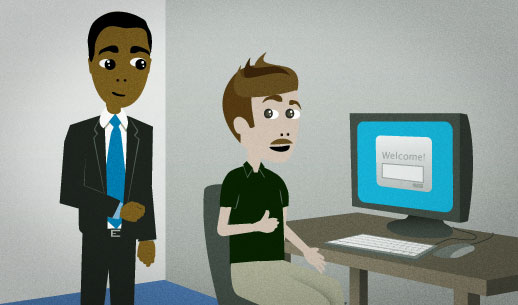“There you go. You should be up and running now.”
You work as a computer tech support specialist. You're installing a piece of software on someone's computer. Now the software has finished installing, so you're ready to let him use the computer again. You say this, giving him use of his computer again.
There you go. You should be up and running now.
Want Video and Sound? Follow us on YouTube

There you go.
You say "There you go" when you're giving or handing a person something:
A: Can you pass me a napkin?
B: There you go.
More generally, you use it when you're doing something for another person. For example, say "There you go" when:
- you stand up to let someone sit down
- you've finished tying someone's necktie for them
- you clear a space on the kitchen counter for someone to set a hot dish on
You can also say "Here you go" in the same way. There are no absolute rules for when to use one or the other, but I would use "Here you go" if I brought something to them from far away, and "there you go" if I'm sitting in one place and handing them the object.
(something) should be (adjective)
Sometimes people talk about their guesses with "should". Use "should" to talk about something that you strongly think is true, but you're not completely sure of:
They should be there at the airport to meet us.
This should be pretty easy.
If we all pitch in and help out, it shouldn't take too long.
(something) is up and running
Use this expression to talk about things that are now working and ready to use. Here are some things that you can describe as "up and running":
- a computer
- a website
- a factory
- a new government program
In the example above, the speaker says "You should be up and running." However, what he means is:
The software should be up and running now.
"You should be..." sounds more casual and friendly.
